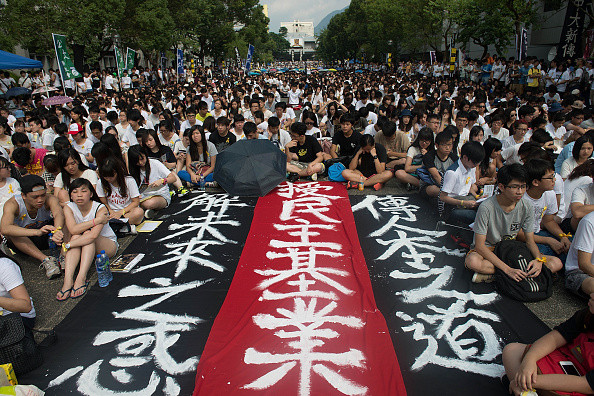Hong Kong Students Boycott Classes in 2017 Election Protest: What You Need to Know

Thousands of students in the special administrative region of Hong Kong, southern China, have started a week-long boycott of lessons, in protest of Beijing's recent stance on Hong Kong's election procedures.
At least 13,000 students from more than 24 institutions gathered on 22 September, 2014, at the Chinese University of Hong Kong in Sha Tin for a sit-in.
Protesters wore yellow ribbons pinned to their shirts – the symbol of the city's democracy movement.
The demonstration's leaders said the sit-in will trigger a wave of "civil disobedience needed to stop the colonisation of Hong Kong."
Why are the students protesting?
Students are protesting after China rejected some candidates for Hong Kong's Chief Executive election in 2017.
The move came a few weeks after China ruled that Hong Kong's potential candidates can be chosen by locals, but also have to be vetted by a Chinese nominating committee.
Contenders need to secure support from at least 50% of the members of the committee; those rejected will not be able to run in the election on the grounds of national security, Beijing said.
The decision enraged thousands of democracy supporters who fear China will use the committee to screen out the candidates it disapproves of.
As reported by the South China Morning Post, Lester Shum of the Federation of Students addressed the demonstrators on Monday by saying: "In the colonial days, the British ruled Hong Kong as if they were a group of refugees and obedient subjects."
"On August 31, [Beijing's] decision would allow the central government and [tycoons] to continue to manipulate the election. Isn't that applying the colonial [approach] to Hong Kong?"
About 400 academics and non-teaching staff are also taking part in the protest.
More strikes in the future
According to the Students Federation's secretary general, Alex Chow Yong-Kang, protesters are demanding that Chinese authorities allow the public to freely nominate candidates for their 2017 elections, abolish functional constituencies in the Legislative Council, and retract Beijing's ruling on political reform.
If the authorities refuse to respond, students want Chief Executive Leung Chun-Ying, Chief Secretary Carrie Lam Cheng Yuet-ngor, and the justice and constitutional ministers to step down.
"Class boycotts may last for only a week, but there could be more strikes in the future. If 10,000 students promote [their causes] in the society... [who can say] it's impossible to change this society?" Chow said.
A mass-demonstration planned by pro-democracy group Occupy Central will take place on 1 October, when thousands are expected to stage a sit-in at Hong Kong's financial district.
Protect Hong Kong's stability
China has defended its ruling on election candidacy for Hong Kong.
Li Fei, deputy secretary-general of the Standing Committee of the National People's Congress (NPCSC) - China's highest national legislative body - said the nominating guidelines would "protect the broad stability of Hong Kong now and in the future"
"It is a legal, fair and reasonable decision. It is a dignified decision," he added.
One country, two systems
Hong Kong was a British colony until it was given back to China in 1997, with the promise the country would be given wide-range autonomy and full freedom in choosing its leaders, under the principle known as "One Country, Two Systems".
According to this principle, stipulated during negotiations between China and the British government about the future of the colony, Hong Kong could retain its established system for at least 50 years after reunification.
© Copyright IBTimes 2025. All rights reserved.




















